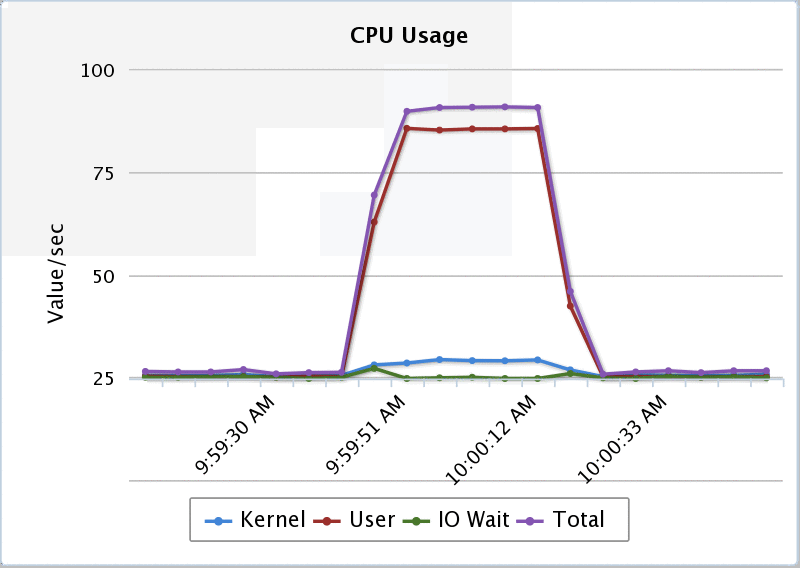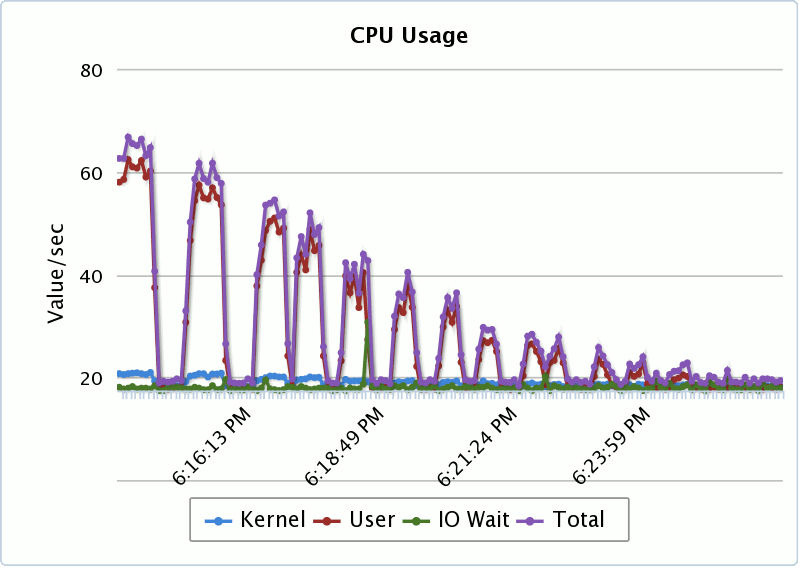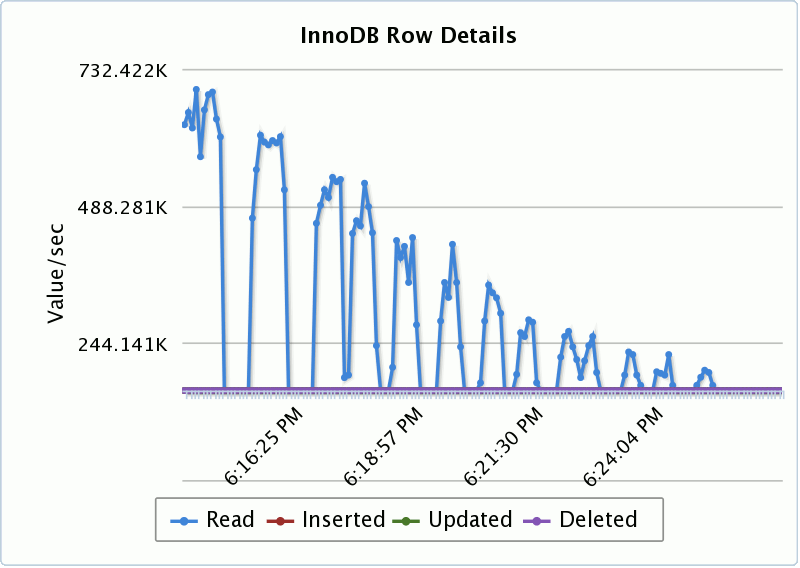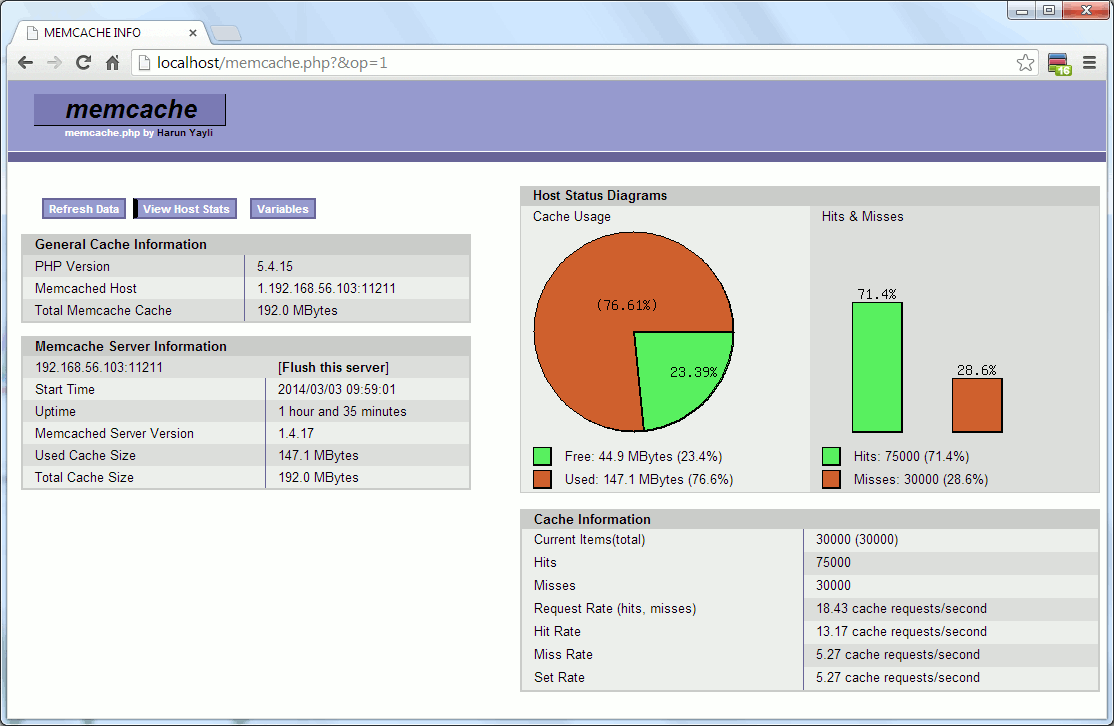Table of contents
Preamble
I know Memcached since a while but I have never taken time to test it a bit. In principle Memcached is a simple in-memory container storing key,value information. My idea was to test it in one of its popular deployment, means with an application server and a database server. My database server will be a MySQL Community Server 5.6.16 and my application server will be a small Java application running under Eclipse on my desktop.
Internally Memcached has below limitation (to be taken into account when implementing it in your Java code:
- The key is an arbitrary string up to 250 bytes in length. No space or newlines for ASCII mode
- The value associated with a key has a 1 megabyte limit on size (can be increased with -I
parameter)
For the Java Memcached client you will often see mentioned this project:
I have used Memcached 1.4.17, Connector/J 5.1.28, spymemcached 2.10.3, Java 1.7.0_51 and all my virtual test servers are running Oracle Linux Server release 6.5 64 bits. In below my database server is server1.domain.com with non-routable IP address 192.168.56.101 and my Memcached server is server3.domain.com with non-routable IP address 192.168.56.103.
Each Virtual Machine has 1 core of my Intel(R) Xeon(R) CPU E5507 @ 2.27GHz and 512MB of RAM.
Memcached installation
As usual either you compiled the latest release from source downloaded on official web site or, lazy approach, you pick the one available with your Linux distribution (maybe not the latest one by the way):
[root@server3 tmp]# yum -y install memcached.x86_64 Loaded plugins: security Setting up Install Process Resolving Dependencies --> Running transaction check ---> Package memcached.x86_64 0:1.4.4-3.el6 will be installed --> Finished Dependency Resolution Dependencies Resolved =============================================================================================================================================================================================================== Package Arch Version Repository Size =============================================================================================================================================================================================================== Installing: memcached x86_64 1.4.4-3.el6 public_ol6_latest 68 k Transaction Summary =============================================================================================================================================================================================================== Install 1 Package(s) Total download size: 68 k Installed size: 147 k Downloading Packages: memcached-1.4.4-3.el6.x86_64.rpm | 68 kB 00:00 Running rpm_check_debug Running Transaction Test Transaction Test Succeeded Running Transaction Installing : memcached-1.4.4-3.el6.x86_64 1/1 Verifying : memcached-1.4.4-3.el6.x86_64 1/1 Installed: memcached.x86_64 0:1.4.4-3.el6 Complete! |
Configuration file (listening port, maximum number of connection and cache size in MB):
[root@server3 init.d]# cat /etc/sysconfig/memcached PORT="11211" USER="memcached" MAXCONN="1024" CACHESIZE="192" OPTIONS="" |
Start it:
[root@server3 init.d]# service memcached start Starting memcached: [ OK ] [root@server3 init.d]# service memcached status memcached (pid 7026) is running... [root@server3 init.d]# ps -ef | grep 7026 498 7026 1 0 12:01 ? 00:00:00 memcached -d -p 11211 -u memcached -m 64 -c 1024 -P /var/run/memcached/memcached.pid root 7042 1837 0 12:01 pts/0 00:00:00 grep 7026 |
I finally realized that installed release is 1.4.4 while latest release on official web site is 1.4.17. So I decided to try to compile it from source and it went well with simply:
./configure --prefix=/usr make make test make install |
Remark:
I don’t know why but if you go on in the download section of Google Project Hosting Memcached web site then the latest available release is 1.14.15 while if you go on http://memcached.org/ then the latest available release is 1.4.17…
I just had to install libevent devel with:
yum install libevent-devel.x86_64 |
Doing this is not at all clean at the running release is not any more the one of the installed package but I wanted to still benefit from start-up script that’s why I decided to overwrite binaries of existing package with old version. Never do this on a production system…
Then for the test database I was thinking to something complex with a kind of sales table and doing summary of sales per day or whatever. I have finally decided to go for something much simpler and used the excellent wed site generatedata.com. Well in fact I had to install their script locally on my desktop using UwAmp as I wanted to generate more than 100 rows (current online web site limitation with no account).
I generated below customers test table with 30,000 rows, I deliberately avoid the creation of a primary key to generate more workload on my MySQL instance:
DROP TABLE `customers`; CREATE TABLE `customers` ( `id` mediumint, `firstname` varchar(255) default NULL, `lastname` varchar(255) default NULL ); INSERT INTO `customers` (`id`,`firstname`,`lastname`) VALUES (1,"Illana","Franklin"); INSERT INTO `customers` (`id`,`firstname`,`lastname`) VALUES (2,"Jade","Jefferson"); . . |
My MySQL instance configuration is as below, deliberately the InnoDB pool is small to avoid having all the rows in cache:
[mysqld] user=mysql basedir=/mysql/software/mysql01 datadir=/mysql/data01/mysql01 port=3316 pid_file=/mysql/software/mysql01/conf/mysql01.pid log_error=/mysql/dump/mysql01/mysql01.err default-storage-engine=innodb tmpdir=/tmp binlog_format=row server-id=1 log_bin=/mysql/logs/mysql01/mysql-bin.log socket=/mysql/software/mysql01/conf/mysql01.sock sql_mode='TRADITIONAL,PIPES_AS_CONCAT' slow_query_log_file=/mysql/dump/mysql01/mysql01-slow.log slow_query_log=1 long_query_time=5 max_allowed_packet=100M default-storage-engine=innodb innodb_buffer_pool_size=10M innodb_flush_log_at_trx_commit=2 innodb_log_buffer_size=12M innodb_log_file_size=50M innodb_log_files_in_group = 4 innodb_thread_concurrency=0 innodb_rollback_on_timeout=1 innodb_lock_wait_timeout=600 innodb_autoinc_lock_mode=2 innodb_flush_log_at_trx_commit=2 innodb_flush_method=O_DIRECT [mysql] default-character-set=utf8 socket=/mysql/software/mysql01/conf/mysql01.sock [client] default-character-set=utf8 socket=/mysql/software/mysql01/conf/mysql01.sock |
Memcached testing
As mentioned above Memcached is storing in memory key,value pairs. There are multiple way to store information I initially thought of id column of my customer table for Memcached key and a string concatenating first name and last name columns for the Memcached value. But I did not find this too much generic and decided to use the most generic way that is also described in Memcached official website. So to hash the whole query with a kind of MD5 function to be use it for the Memcached key and the Java SQL resultset with minimal transformation for the Memcached value (this resultset must be below 1 MB in size). Doing this it could be used for any other test scenario…
Using spymemcached the two most used Memcached client functions are:
- set to store a key,value pair in Memcached server
- get to retrieve a value associated with a key in Memcached server
I tried the straight approach with:
c.set(MD5encode(query1), 3600, rs); |
Where rs is a classical ResultSet from java.sql.ResultSet Java class but got the annoying below error:
Exception in thread "main" java.lang.IllegalArgumentException: Non-serializable object at net.spy.memcached.transcoders.BaseSerializingTranscoder.serialize(BaseSerializingTranscoder.java:110) at net.spy.memcached.transcoders.SerializingTranscoder.encode(SerializingTranscoder.java:162) at net.spy.memcached.MemcachedClient.asyncStore(MemcachedClient.java:296) at net.spy.memcached.MemcachedClient.set(MemcachedClient.java:884) at jdbcdemo4.jdbcdemo4.main(jdbcdemo4.java:99) Caused by: java.io.NotSerializableException: com.mysql.jdbc.JDBC4ResultSet at java.io.ObjectOutputStream.writeObject0(Unknown Source) at java.io.ObjectOutputStream.writeObject(Unknown Source) at net.spy.memcached.transcoders.BaseSerializingTranscoder.serialize(BaseSerializingTranscoder.java:105) ... 4 more |
Believe me or not but I have spent hell of time on this until I found two very nice references on how to handle it (How to serialize ResultSet in java and Storing MySQL result set in memcached). I mean generic solution on how to handle it because you find countless solution that are tightly linked to the format of your resultset, which again I did not want to remain as much generic as possible…
In short the trick is to use CatchedRowSetImpl class object that serialize ResultSet and have the same methods…
To write my code what was missing is a function to MD5 hash my query text to use it as a Memcached key, Google was my friend and I found many references. I decided to use the one of How to generate MD5 Hash in Java – String Byte Array digest Example as it was most concise one.
Then the principle is quite simple, I generate a random query which select first and last name of customers table for a random id. I MD5 encode the query and check if the result is in Memcached. If yes then I get it and display its value. If not then we have to execute the query on MySQL instance and store its result in Memcached (I have used to maximum retention time, 30 days, as I was testing for multiple days. You should not do this by default…). I execute 1,000 queries per run.
I have also added a execution time computation to have some figures to compare as well as percentage of query results found and not found in Memcached. Of course the implementation in your Java code is not transparent at all and everything must be (re)develop with the idea to use Memcached before going to the MySQL instance. Finally Java code gives something like:
package jdbcdemo4; // MD5 import java.security.MessageDigest; import java.security.NoSuchAlgorithmException; // Spymemcached import net.spy.memcached.MemcachedClient; import net.spy.memcached.AddrUtil; import net.spy.memcached.BinaryConnectionFactory; //import com.mysql.jdbc.jmx.LoadBalanceConnectionGroupManager; import com.mysql.jdbc.Driver; import java.util.Properties; import java.sql.ResultSet; import java.sql.Connection; import java.sql.SQLException; import java.util.Random; import com.sun.rowset.CachedRowSetImpl; import java.util.concurrent.Future; import java.util.concurrent.TimeUnit; import java.util.concurrent.TimeoutException; public class jdbcdemo4 { private static String MD5encode(String string1) { String md5=null; if (string1 == null) return null; try { MessageDigest digest1 = MessageDigest.getInstance("MD5"); byte[] hash = digest1.digest(string1.getBytes()); StringBuilder sb = new StringBuilder(2*hash.length); digest1.update(string1.getBytes()); for(byte b : hash) { sb.append(String.format("%02x", b&0xff)); } md5=sb.toString(); } catch (NoSuchAlgorithmException e) { e.printStackTrace(); } return md5; } public static void main(String[] args) throws Exception { Driver driver = new Driver(); Properties props = new Properties(); ResultSet rs; Connection conn = null; String JDBC_URL = "jdbc:mysql://192.168.56.101:3316", query1, query1_md5; Random generator = new Random(); CachedRowSetImpl crsi=new CachedRowSetImpl(); MemcachedClient c=new MemcachedClient(new BinaryConnectionFactory(), AddrUtil.getAddresses("192.168.56.103:11211")); Object object1=null; int in_memcached=0, not_in_memcached=0, id; long start_time = System.currentTimeMillis(); props.put("user","yjaquier"); props.put("password","secure_password"); System.out.println("------------ MySQL Connector/J JDBC pooling testing ------------\n"); System.out.println("Trying connection...\n"); // Get JDBC connection try { conn = driver.connect(JDBC_URL, props); } catch (SQLException e) { e.printStackTrace(); System.exit(1); } // Looping and executing queries and try to get first the result from Memcached for(int i=1; i <= 1000; i++) { id=generator.nextInt(30000) + 1; System.out.print("\nQuery "+i+" for id="+id+", "); query1="SELECT firstname,lastname FROM test.customers where id="+id; query1_md5=MD5encode(query1); Future<Object> f=c.asyncGet(query1_md5); try { object1=f.get(5, TimeUnit.SECONDS); } catch (TimeoutException e) { f.cancel(false); System.out.println("Memcached timeout..."); } if (object1==null) { System.out.print("Query result not in Memcached, "); not_in_memcached++; rs = conn.createStatement().executeQuery(query1); crsi.populate(rs); rs.close(); c.set(query1_md5, 60*60*24*30, crsi); while (crsi.next()) { System.out.print("customer : " + crsi.getString("firstname")+", "+crsi.getString("lastname")); } crsi.close(); } else { System.out.print("Query result in Memcached, "); in_memcached++; crsi = (CachedRowSetImpl)object1; crsi.beforeFirst(); while (crsi.next()) { System.out.print("customer : " + crsi.getString("firstname")+", "+crsi.getString("lastname")); } crsi.close(); } } System.out.println("\nExiting..."); if (conn != null) { conn.close(); } c.shutdown(); long end_time = System.currentTimeMillis(); System.out.println("Executed in " + (end_time - start_time) + " milliseconds"); System.out.println("Percentage in Memcached "+Math.round(in_memcached*100/(in_memcached+not_in_memcached))+"% ("+in_memcached+"), not in Memcached "+ Math.round(not_in_memcached*100/(in_memcached+not_in_memcached))+"% ("+not_in_memcached+")"); } } |
Performance results
For the first run allmost all results are not in Memcached and we have the worst execution time:
Executed in 31321 milliseconds Percentage in Memcached 1% (17), not in Memcached 98% (983)
I have done multiple run and it is constantly between 31 and 32 seconds (flush the Memcached server after each run unless obviously the time is decreasing, see below).
For MySQL server monitoring I have used MONyog that is included in our SkySQL contract. Here below are the MySQL server CPU details and InnoDB statistics:


If we execute it over and over more and more query results are in Memcached, of course I have a small number of possible query results and they can all fit in my Memcached server (192 MB). In two below charts we easily see the decrease in MySQL server CPU and InnoDB usage:


It decreases till you reach a perfect run where all results are found in Memcached:
Executed in 3214 milliseconds Percentage in Memcached 100% (1000), not in Memcached 0% (0)
I have also done multiple run and it is constantly between 3.2 and 3.3 seconds so around 10 times improvement. But the most important thing is the decrease of load on the MySQL server, I’m not displaying any charts are all is flat when query results are all in Memcached. I would even say that even with the same response time it would be satisfactory. The Memcached server has a CPU load of 35-40% (1 virtual CPU see above VMs sizing).
After this testing I realized that I did not deactivate MySQL query cache:
mysql> show variables like 'query%'; +------------------------------+---------+ | Variable_name | Value | +------------------------------+---------+ | query_alloc_block_size | 8192 | | query_cache_limit | 1048576 | | query_cache_min_res_unit | 4096 | | query_cache_size | 1048576 | | query_cache_type | OFF | | query_cache_wlock_invalidate | OFF | | query_prealloc_size | 8192 | +------------------------------+---------+ 7 rows in set (0.00 sec) |
But realized after few query cache efficiency charts that query cache is not in action even if query cache size is non-zero because a new parameter has been added and is set to OFF by default (since MySQL 5.6.8): query_cache_type. So in short query cache is allocated but not activated. You can dynamically activate is by changing query_cache_type versus setting to off query cache size and not being able to dynamically activate it…
The question could be on the competition between MySQL Query cache and Memcached. The Memcached FAQ has a quite strong position on this:
What about the MySQL query cache?
The MySQL query cache can be a useful start for small sites. Unfortunately it uses many global locks on the mysql database, so enabling it can throttle you down. It also caches queries per table, and has to expire the entire cache related to a table when it changes, at all. If your site is fairly static this can work out fine, but when your tables start changing with any frequency this immediately falls over.Memory is also limited, as it requires using a chunk of what’s directly on your database.
Looking for monitoring, performance information (hitrate, ..) ?:
[root@server3 bin]# telnet server3 11211 Trying 192.168.56.103... Connected to server3. Escape character is '^]'. stats STAT pid 8534 STAT uptime 736 STAT time 1393843959 STAT version 1.4.17 STAT libevent 1.4.13-stable STAT pointer_size 64 STAT rusage_user 0.047000 STAT rusage_system 0.668000 STAT curr_connections 10 STAT total_connections 12 STAT connection_structures 11 STAT reserved_fds 20 STAT cmd_get 1000 STAT cmd_set 982 STAT cmd_flush 0 STAT cmd_touch 0 STAT get_hits 18 STAT get_misses 982 STAT delete_misses 0 STAT delete_hits 0 STAT incr_misses 0 STAT incr_hits 0 STAT decr_misses 0 STAT decr_hits 0 STAT cas_misses 0 STAT cas_hits 0 STAT cas_badval 0 STAT touch_hits 0 STAT touch_misses 0 STAT auth_cmds 0 STAT auth_errors 0 STAT bytes_read 5069673 STAT bytes_written 147252 STAT limit_maxbytes 201326592 STAT accepting_conns 1 STAT listen_disabled_num 0 STAT threads 4 STAT conn_yields 0 STAT hash_power_level 16 STAT hash_bytes 524288 STAT hash_is_expanding 0 STAT malloc_fails 0 STAT bytes 5049018 STAT curr_items 982 STAT total_items 982 STAT expired_unfetched 0 STAT evicted_unfetched 0 STAT evictions 0 STAT reclaimed 0 END |
Not very sexy, as described in Memcached official documentation for better reporting I have tried two self contained project (means not a plugin for an existing monitoring solution like Cacti or Nagios) and tried successfully:
For PhpMemcacheAdmin 1.2.2:

For PHP-based control panel 1.1.2.3:




